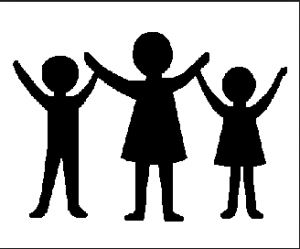
Let’s take a look at the theory of birth order, along with how your birth order could make a difference in how much revenue you’ll generate, how you negotiate with clients, or what type of service you’ll offer, just to name a few scenarios.
What is birth order?
Birth order is the dynamic that’s tied to the order you were born within your family of origin. There’s usually the oldest child and the youngest child-those roles tend to be firm within most families.
But depending upon how many children are in a given family, there’s the middle child, or there might be a couple of children who fall in the middle.
And in larger families, children who fall in between the oldest and the youngest will take on the characteristics of the marker children they closest in age to.
There are all sorts of characteristics and personality traits that birth order will place upon a person, and it’s very common for those character and personality traits to show up in business.
Specifically, they’ll show up in the way that a person chooses to start, operate, and manage a business, especially when if they manage employees or choose to work alone.
The oldest child
According to studies noted within an article published on Business Insider,
Firstborns are likely to be more Type A, self-disciplined, and even have a higher IQ than younger siblings. The reason? Parents tend to be stricter with them than children who come later.
Bonus if you’re female: Turns out all this trailblazing can make you stronger in the real world. Firstborn women end up 13% more ambitious than even firstborn men.
…Considering the tendency to pursue higher degrees, it’s no surprise that firstborns turn to careers that require higher education, from medicine to accounting. In fact, they’re used to climbing to the top in business as well: More CEOs are firstborn than any other place in the birth order.
The first-borns almost always bear the majority of responsibility out of all the kids in a family. From the time they were little, they were trained to care for and look out for their siblings’s well-being.
The first-borns were the ones responsible for household chores. And often, the oldest is held responsible for surrogate parenting, including making sure that the younger children are behaving at home, and in public.
If you’re a first-born, then there’s no doubt about it-you were born for leadership! You’re the kid who was expected to succeed, and your sense of responsibility often led you towards making the type of measured, challenging, self-sacrificial decisions that all entrepreneurs/managers need to thrive, and, well, lead!
Chances are very good that you’re a natural problem solver-you’ve survived countless scenarios where you were expected to break up sibling fights, protect your siblings from bullies, all while ensuring that your parents were happy.
You’re also great at understanding the big picture and simplifying complicated concepts. You’re also sure of yourself and your decisions, and you thrive when others recognize these traits as positives.
The middle child
Like the infamous middle child moment that Jan Brady experienced on T.V. years ago (Marcia, Marcia, Marcia!), you probably grew up feeling ignored, disregarded, while trying to find an important place in your family.
However, there’s lots important characteristics and personality traits that your experience allows you to bring to business. For starters, middle children are usually very personable people. They like getting along with everyone, and they tend to have warm, friendly personalities.
And let’s face it-people tend to want to do business with those they like, right?
Also, middle children make great diplomats-they tend to be the peacemakers of the family, wanting everyone to get along. They hate choosing sides emotionally, and they hate being in the middle of discord.
If you’re a middle child, then you know how to work well with vendors, clients, and employees. You tend to have a gift for fairness and empathy. You don’t want anyone you do business with to feel disregarded or disrespected.
Because of your desire for inclusion along with your natural ability to be a great team member, you’d do well in starting or managing an agency. Even if you start a franchise or a micro-business, you’ll do well in areas such as promoting great morale, branding, and marketing.
You thrive when you can work towards a great good or a higher purpose that affects all involved. You’re great at generating passion towards causes.
The youngest child
There are many negative connotations associated with the youngest child. The youngest child is a spoiled brat! The youngest child is often treated like a delicate baby, well into their adult years.
The youngest child is rarely held to the same standards of responsibility as their older siblings. And since most parents are a lot more chill by the time the youngest child is born, it’s said that the youngest gets away with a more when it comes to discipline.
But very little of these stereotypes might apply to you if you’re the youngest child, and in fact, working as a freelancer, especially as a commercial creative, is right up your alley.
Later-borns are more flexible, innovative, laid-back and sociable. These characteristics can impact entrepreneurs from the start: Older siblings often go for the safe bet, while the younger ones are likely to be risk-takers.
First-borns might make better franchisees, while later-borns often undertake more experimental and quirkier businesses.
What about only children?
You might have grown up feeling forgotten about by society, but I haven’t forgotten about you, only-child!
You didn’t grow up with siblings, and that often left you feeling lonely. However, growing up by yourself often brought out amazing characteristics and personality traits that propels any business owner, or manager.
Alix Montes shares his experience of being an only-child on Levo, along with how those experiences molded him professionally:
One of the most obvious aspects of life as an only child is the absence of brothers and sisters or playmates by default. This means I always had to make up my own fun growing up. I was in charge of making sure I enjoyed what I was doing with my time — whether it was with toy props, a bike or computer games.
…Out of being responsible for my own fun and coming up with new challenges for myself came a sense of independence. I became very comfortable being in my own space. Not having siblings to impress or to try and fit in with allowed me to develop my own thoughts and opinions.
…As I grew up, this made it easier to be myself in environments where I might clearly stand out. At work, this has allowed me to be myself and feel confident in what I bring to the table.
Are birth order roles set in stone?
While there’s a lot of truth to the theory that birth order does determine one’s level of success in life and business, like many things in life, nothing is set in stone.
Business Insider, citing a University of Illinois study source, says:
While they did find differences between firstborns and their younger siblings — true to stereotype, firstborns do have slightly higher IQs and do tend to be slightly more conscientious, extroverted, and agreeable — they also found those differences are so minuscule as to be practically meaningless.
The average correlation between personality traits and birth order: 0.02. “[I]n terms of personality traits and how you rate them, a 0.02 correlation doesn’t get you anything of note,” explains psychology professor Brent Roberts, one of the study’s coauthors, in a statement.
Even while reading sources for this post, I thought about how birth order played a part in my sibling group, regarding career choices. I’m the oldest child, and while a great deal of elder child personality traits apply to me, when it comes to starting a business, I took on characteristics that supposedly belong to the youngest child.
While I started my work career in a role that provided stability while requiring a sense of duty (the Air Force), I quickly realized that this environment wasn’t right for me.
While I’m proud and grateful to have been able to serve, I know that I’m too creative, artistic, and progressive-thinking to fit within that mold-this is probably why I’ve thrived as a freelance writer.
Conversely, my youngest brother’s disposition is much more stoic and straight-laced than mine. When it comes to our career choices (and frankly, financial management) he fits into the elder-child stereotypes more than I do.
Although I’m the creative/entrepreneur of the family, I’d hire him as my accountant all day long!
If you’ve ever wondered how those first 18-20 years of your life formed your business personality and how you operate, you might be on to something. Embrace what those years have formed inside you, and you’ll find that your business will thrive as you scale organically.

